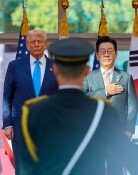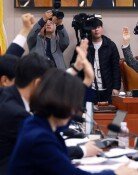Fewer Foreign Correspondents in Seoul
Fewer Foreign Correspondents in Seoul
Posted June. 09, 2006 07:16,
There is no star journalist in Korea, an expatriate official from an international organization said on the condition of anonymity as he evaluated U.S. journalists working in Korea.
He, who is a frequent new source for English speaking correspondents, and in particular, U.S. journalists, said, A star-level journalist must have extensive knowledge about the geopolitical situation on the Korean peninsula, good command of Korean, and a rich pool of local sources at various levels.
He cited professor Don Oberdorfer at Johns Hopkins, who is the author of The Two Koreas, and served as a renowned Seoul correspondent for the Washington Post, and Paul Eckert at Reuters as the best examples of this type of reporter.
Mr. Eckerts wife is Korean. He speaks fluent Korean and has deep understanding about the Korean peninsula. Even after he moved back to the US as a White House correspondent last year, he still asks sharp questions about this region based on his profound knowledge of the peninsula.
However, he said that there are few such journalists in Seoul, the window to news on the peninsula nowadays. Why is that?
First of all, news agencies are cutting back on the number of Seoul correspondents due to financial difficulties. Time, a U.S. weekly, recently closed its Seoul office. Rumors have it that the incorrect reports on the stem cell research involving Dr. Hwang Woo-suk last year affected the decision, too.
The Wall Street Journal, which has a branch office in Seoul, also opened a branch in Shanghai and moved the Seoul bureau chief to China, leaving the post in Korea vacant.
Among U.S. news agencies, only a few, such as the Los Angeles Times, Voice of America and CNN have a branch office or full time correspondents in Korea. Major newspapers including the New York Times just have freelancing stringers in Korea.
Some people point out that such poor foreign correspondence makes it hard to collect information about North Korea. John Feffer, a freelance journalist and former vice editor of World Policy Journal, said in his lecture at the Korean Embassy in Washington at the end of last month, As Americans have no chance to directly contact North Korea and the media depend on the information provided by the government, many U.S. journalists misunderstand the North. He added, The withdrawal of U.S. correspondents from Korea due to financial problems is part of the problem.
In fact, most U.S. journalists in Seoul find it hard to contact the domestic media due to language barriers. They mostly depend on FBIS, the CIA`s media monitoring database, for information. FBIS monitors, translates foreign newspapers and broadcasting, and provides the results to government agencies.
Jung-Ahn Kim credo@donga.com







